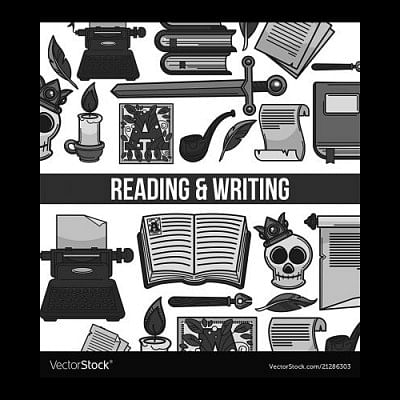On (Dis)connection between Reading and Writing

Back in 2005 in California, I was reading Edward Said's Power, Politics, and Culture. This book is a collection of twenty-eight interviews conducted over three decades, in which Said fielded various questions on culture, literature, history, politics, and music. One of the interviewers asked, "Who should we read to know about South Asia?" He replied, "Eqbal Ahmad." I knew nothing about Eqbal Ahmad. I immediately checked out his Selected Writings of Eqbal Ahmad from the University library. From GoogleI located the columns he contributed to the DAWN in Pakistan. Reading Ahmad's work, I learned that when he was a child, he met Mahatma Gandhi. Once his elder brother suggested, "Since you can meet Gandhiji, ask him how to become a good writer. He is a good writer." In his next meeting with Gandhi, Ahmad said, "My brother said that you are a good writer. Could you please tell me how to become a good writer?"Gandhi suggested, "Read the King James version of the Bible." So I checked out the King James version of the Bible, but I could put up with it for barely an hour. It cracked my concentration and sapped my appetite for reading. It's archaic, allegorical, and paradoxical. It is studded with gems of poetics, but I wanted to read something lean, direct, and concrete. I discovered no connection between reading the Bible and honing one's writing skills.
Doesn't writing presuppose extensive reading? Yes, of course. The connection between reading and writing, however, is neither inevitable nor automatic. What is eating to the human body is reading to a writer. Good food nourishes the body, but junk food destroys it. Similarly if a writer is on a diet of junk prose, it can destroy her writing mind and muscles. Both in so called creative and critical genres, some writing is just typing. It contains nothing for a reader–neither content, nor language–to emulate. Avoiding insipid prose is often not an option because of academic and professional obligations. While some people have to write without learning about the craft of writing, for others, as George Orwell claims in his essay, "Politics and the English Language," bad writing is a considered option. Bad prose seeps in and survives. Exposure to bad writing provides no model for good writing. Reading under such a circumstance hardly complements writing. Reading mush prose leads toeither no writing, or messed up writing.
The production of good prose presupposes savoring sprightly writing. Steven Pinker in The Sense of Style, claims that we become writers by spotting, savoring, and reverse-engineering examples from good prose. While his argument proposes that the act of writing is inseparable from the act of reading, it warrants some clarification. If reading is to complement writing, a reader must read like a writer. She must notice the mechanical, semantic, syntactic, and rhetorical options and restrictions a writer chooses or chooses to avoid to transcribe her thoughts. Reading as a means of decoding information adds little to the arsenal of a writer. A passive reader is not helping herself to become a potential writer. Inadvertently or not, reading in academic context is mostly passive. Very few academic readers care about the styles and strategies of writing. While they read, they look only for content. They seldom notice the frequent flashes of writerly flair or the slips and skips in a piece of writing. They come away from reading informed, but not inspired to emulate the magic and music that words embody. Discovering a writer lurking beneath the text is perhaps the first step toward becoming a writer. In order for that to happen, Pinker claims that a writer must have a "sensitive radar" as a reader. Most readers don't have that.
That doesn't seem consequential. Writing in an academic context is subservient to reading. An author is not an authority. A reader is. A writer is intellectually impaired and ethically deficient. She has no value, vision, or philosophy. Money, fame, revenge, and sex drive her to write. She is but what a reader thinks she is.There's nothing in writing. It's all in reading. While such a deconstructionist approach to reading has its rewards, it fails to draw upon the intellectual possibilities of writing. No writer knows exactly what she will write until she writes it. Writing makes fuzzy and formless thoughts clear and concrete to a writer. Every writer wants to answer the question that E.M. Forster asked in Aspects of the Novel: "How do I know what I think until I see what I say?" Writing is thinking, but writing also disciplines and enhances our thinking ability. Every original writing responds to a unique rhetorical context. A writer must not reproduce what she already knows. She must create new knowledge. She must avoid what is already done and said. When a writer is faced with such a problem–dare I claim that writing is problem solving?–she creates a unique world of word and wisdom. A possessed reader is a paralyzed writer.
If that sounds a little off-kilter, we should listen to Toni Morrison. She served as an acquisitions editor for Random House for about 20 years. Having been a professional reader for about two decades, she claims in her"Paris Review" interview, "Reading is not enough for writing." Exactly! Writing has never been simply an adjunct to or outgrowth of reading. Reading plays a facilitative–but non-causal–role in writing. Writing has its own grammar. Composition scholarAnn Raimes claims in her essay, "What Unskilled ESL Students Do as They Write: A Classroom Study of Composing," that for writing, we need two types of codes: linguistic code and written code. By linguistic codes she means the mechanics of writing: grammar, spelling, capitalization, indentation, and punctuation. The mechanics of writing can be straightforwardly learned or taught. The written codes, by contrast, refer to the rhetoric of writing: audience, purpose, presentation, voice, word choice, and sentence fluency. What makes good writing good is its rhetorical elegance and its rhetorical effect on readers. Rhetoric in writing is not as easily amenable to teaching or learning as mechanics. Rhetoric in writing is mostly an area of inductive development. While reading familiarizes a potential writer with the rhetoric of writing, a writer must discover and absorb besides and beyond reading. Reliance on reading might persuade a potential writer to believe that writing is all about renewing some else's rhetorical model. Writing, though, is all about creating a new rhetorical model. Reading might misguide a writer about what it means and takes to be a writer.
Unless reading materials are carefully selected in academic context, reading and writing don't form a continuum. They form a dichotomy. Steven Pinker in The Sense of Style claims that academic writing is mostly bad writing. Most academics suffer from a common defect: the curse of knowledge. Academics know their stuff well, so well that sometimes jargon, argots, and technical terms fall out of their mouths automatically. They assume that what they know, everyone does. This disposition begets writing that is stuffy, pompous, and affected. It lacks affect and human interest. It's arid writing that has no potential for absorbing writing skills. Also, good writing requires courage and conviction. But academics hedge. They don't stand by what they claim. Writing becomes impersonal and imponderable, consequently touching and transforming no readers. Academics and their students can't seem to keep themselves from reading and reproducing such prose. How does reading in such a system provide resources for writing?
It doesn't. Nonetheless, I would sound naïve if I claim that there's no connection between reading and writing. Reading is the life-blood of writing. All so-called gifted writers were–and are–voracious readers. No composition scholar has ever claimed that writing can be learned and taught independent of reading. Composition professionals, instead, claim that a teacher of writing is inevitably a teacher of reading. How does a writer discover and augment herself without reading? Reading takes a writer beyond her quotidian self. It gives her a richer and more complex space to grow and learn. Reading renews and recreates a writer. It expands the consciousness of a writer, and connects her to her inner self, the fount of writing. The death of a reader is the death of a writer. However, despite the symbiotic connection between reading and writing, an original writer must deal with–even ignore– what renowned critic Harold Bloom calls "anxiety of influence." A reader must grab something from reading, but that's not the gift she gives the world as a writer. She is not a facsimile of her predecessors. She must write something that carries her signature. Promoting reading as an essential cognate to writing warrants some caution.
Mohammad Shamsuzzaman is Assistant Professor, Department of English and Modern Languages, North South University.

 For all latest news, follow The Daily Star's Google News channel.
For all latest news, follow The Daily Star's Google News channel. 



Comments